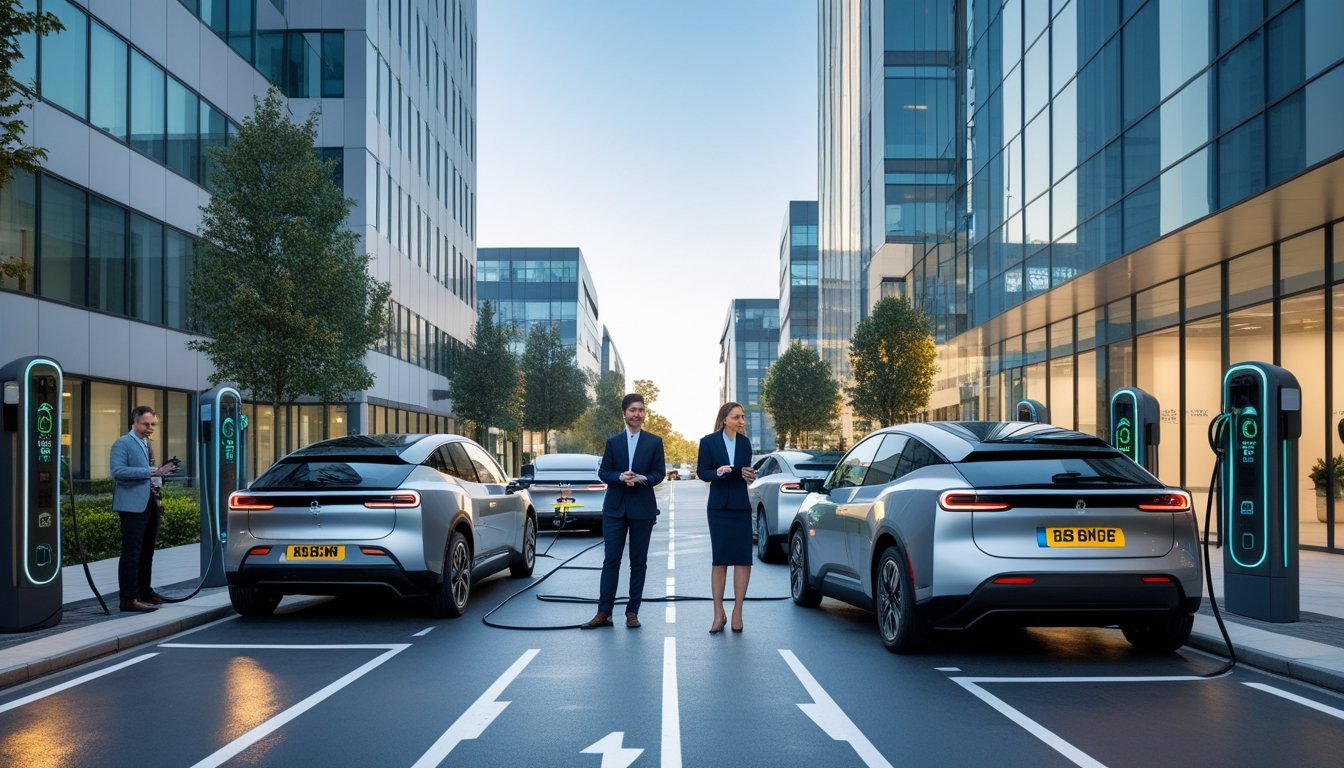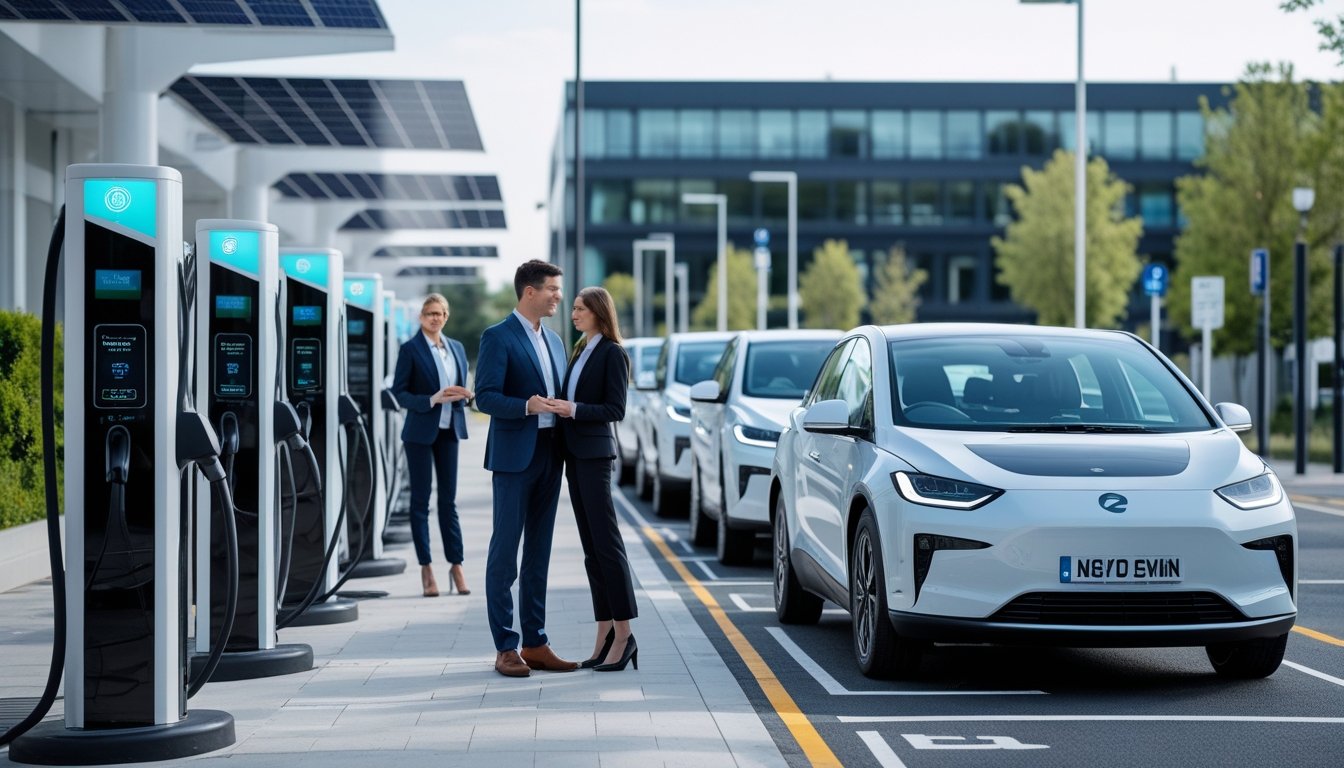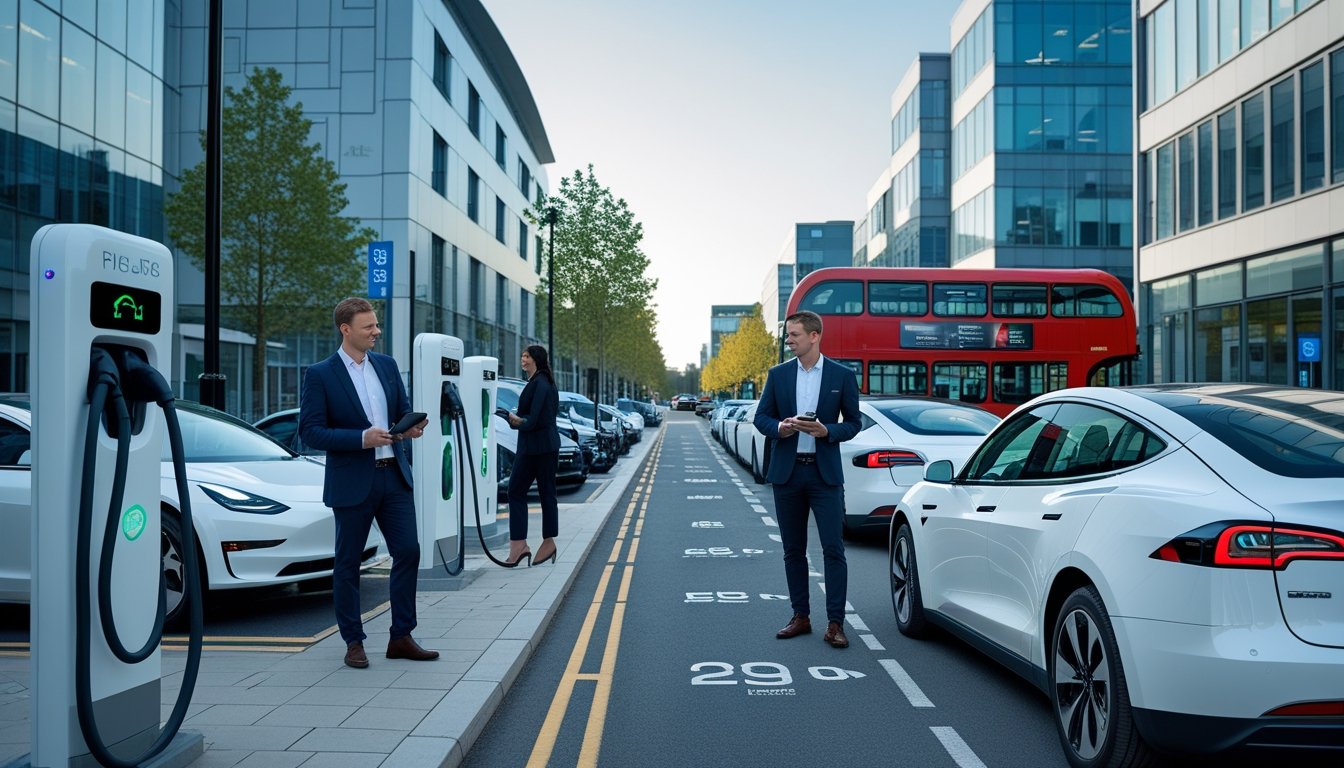Late updated: 18 Jul 2025 09:07
Written by: Amber Collins
The Future Of Electric Cars In UK Business Transport: Revolutionising Corporate Mobility
As electric vehicles become a staple in the UK, businesses are navigating a transformative period in transport logistics. Electric cars are poised to revolutionise UK business transport by offering sustainable, cost-effective solutions that align with national climate goals. With regulatory support and advancing technologies paving the way, the shift towards electric vehicles for corporate fleets is gaining unprecedented momentum.

Companies are increasingly recognising the long-term benefits of transitioning to electrified transport. Lower operational costs, combined with governmental incentives and the evolving public and private charging infrastructure, are making the switch not just necessary but advantageous. This transition is not only becoming a strategic move to enhance sustainability but also a way to gain a competitive edge in the business environment.
In this article, we'll explore the factors shaping the future of electric vehicles in UK business transport. We will delve into infrastructure developments, economic benefits, and the policies driving this evolution, providing insights to help businesses adapt to this dynamic landscape.
Key Takeaways
- Electric vehicles are revolutionising UK transport.
- Corporate fleet adoption is driven by lower costs and incentives.
- Infrastructure and policy are crucial for future developments.
Key Drivers Shaping the Future of Electric Cars in UK Business Transport
The future of electric vehicles (EVs) in UK business transport is influenced by several key drivers. These include government mandates for environmental goals, economic aids like salary sacrifice schemes, and technological breakthroughs that enhance the practicality and attractiveness of EVs.
Government Regulations and Net Zero Commitments
The UK government has set ambitious goals to decarbonise the transport sector, aiming for a Net Zero emissions target by 2050. A significant part of this strategy is the Zero Emission Vehicle (ZEV) mandate, which requires a growing percentage of car sales to be zero-emission vehicles.
By 2030, the sale of new petrol and diesel cars will be banned, further propelling EV adoption. These regulations push businesses to reconsider their fleet compositions, transitioning from internal combustion engines to electric alternatives. The focus is not only on meeting legal obligations but also on contributing to broader environmental objectives. This shift is crucial for aligning business strategies with national climate goals, ensuring long-term sustainability.
Economic Incentives and Salary Sacrifice Schemes
Economic incentives play a vital role in driving EV adoption among UK businesses. Salary sacrifice schemes allow employees to lease electric vehicles without taking a tax hit, making EVs financially accessible. These schemes have proven effective in encouraging both fleet managers and employees to consider EVs as a viable option.
Further economic benefits come in the form of grants and reduced vehicle tax rates, which make operating costs more appealing compared to traditional vehicles. This financial support helps offset initial purchase prices or leasing costs, increasing the attractiveness of electric cars for company fleets. By taking advantage of these incentives, businesses can reduce expenses while demonstrating environmental responsibility.
Technological Advancements and Range Improvements
Technological advancements have significantly boosted the appeal of electric cars in the business sector. Recent improvements in battery technology have extended the range of EVs, alleviating common concerns related to limited mileage. Ranges of over 300 miles per charge are now achievable, making electric cars suitable for long-distance business travel.
Infrastructure development also supports wider EV adoption. The installation of rapid charging stations across the UK has increased convenience and reduced the time required for recharging. These advances in technology not only improve the efficiency and practicality of EVs but also enhance their competitiveness against internal combustion engine vehicles, making them a smarter choice for modern business operations.
Essential Infrastructure and Business Adoption Challenges

As electric vehicles (EVs) gain momentum, the transformation of transport hinges largely on the development of charging infrastructure and the adoption of electric technologies by businesses. Addressing these challenges is critical for seamless transitions.
Growth and Distribution of Charging Infrastructure
The landscape of charging infrastructure is expanding rapidly. The United Kingdom has made commendable strides, boasting an impressive growth in charging points. With over 61,000 points at more than 32,000 locations, the accessibility of charging networks is improving. However, equitable distribution remains a challenge, particularly in rural regions.
To address these disparities, strategic placement of charging stations is essential. Businesses and local authorities are collaborating to ensure that charging infrastructure supports commercial needs while reducing urban congestion. Growth in public charging stations is crucial in supporting the projected boom in electric mobility.
Overcoming Range Anxiety with Ultra-Rapid Charging
Range anxiety remains a critical issue for businesses considering EVs as part of their fleet. The fear of running out of power without convenient access to charging impacts adoption rates. To mitigate this, ultra-rapid charging stations are being developed, offering promising solutions.
These stations significantly reduce charging time, allowing vehicles to recharge as quickly as traditional refuelling. By integrating ultra-rapid charging, we can alleviate concerns over range anxiety, making fleet deployment more feasible. The integration of renewable energy sources into these stations further supports our decarbonisation goals.
Decarbonisation and Fleet Electrification Initiatives
Businesses are increasingly turning to fleet electrification to meet decarbonisation targets and support environmental commitments. Initiatives are being implemented to facilitate this change, with incentives encouraging the shift from petrol and diesel vehicles. These initiatives are supported by government funding and policies aimed at reducing emissions in line with climate goals.
As we transition, the focus remains on infrastructure enhancements and accessible EV charging options, ensuring that logistics and delivery sectors can seamlessly adapt to electric fleets. The path forward demands collaboration between BT, government, and industry to support fleet electrification and ensure sustainable growth in this arena.
Frequently Asked Questions

As electric vehicles become integral to UK business transport, there are numerous questions around subsidies, incentives, and policies. Understanding these elements aids companies in effectively transitioning to electric fleets.
What subsidies are available to UK businesses for the implementation of electric vehicles?
In the UK, various subsidies are available for businesses investing in electric vehicles. The Office for Zero Emission Vehicles (OZEV) offers grants covering part of the purchase cost of eligible vehicles. Additionally, leasing arrangements often include incentives to further ease the transition to electric fleets.
How do UK government incentives impact the adoption of electric cars within corporate fleets?
Government incentives have significantly influenced the shift towards electric cars. Benefits such as reduced Benefit-in-Kind (BiK) tax rates and grants for charging infrastructure encourage fleet managers to opt for electric vehicles. These financial advantages make the adoption of electric cars a more viable option for businesses, leading to increased uptake.
What are the criteria to qualify for electric van subsidies in the UK?
Specific criteria must be met for businesses to qualify for electric van subsidies. Vehicles should have CO2 emissions below a certain threshold and meet minimum range requirements. Additionally, businesses need to ensure that the vehicles meet payload and weight specifications as outlined by the grant criteria.
What policies are UK companies adopting for the installation of EV charging stations at the workplace?
Many UK companies are introducing policies to facilitate the installation of EV charging stations at workplaces. These include partnerships with energy providers to install charging infrastructure and offering employees incentives to use these facilities. Ensuring accessibility to charging stations is key to supporting the widespread use of electric company cars.
How will the electric car grants evolve going into 2024 for UK businesses?
Looking ahead to 2024, changes in electric car grants are anticipated. The focus may shift towards supporting sustainable growth and enhancing the charging infrastructure network. We expect adjustments in eligibility criteria to encourage broader adoption, with an emphasis on long-term sustainability goals and innovation in the sector.
Are there any voucher schemes for electric vehicles that UK businesses can benefit from?
Yes, several voucher schemes are available intended to mitigate the upfront costs associated with electric vehicles. These schemes often cover various elements such as installation of charging stations or purchase of electric vans. Accessing these vouchers can substantially reduce the initial financial burden for businesses transitioning to electric transport solutions.
